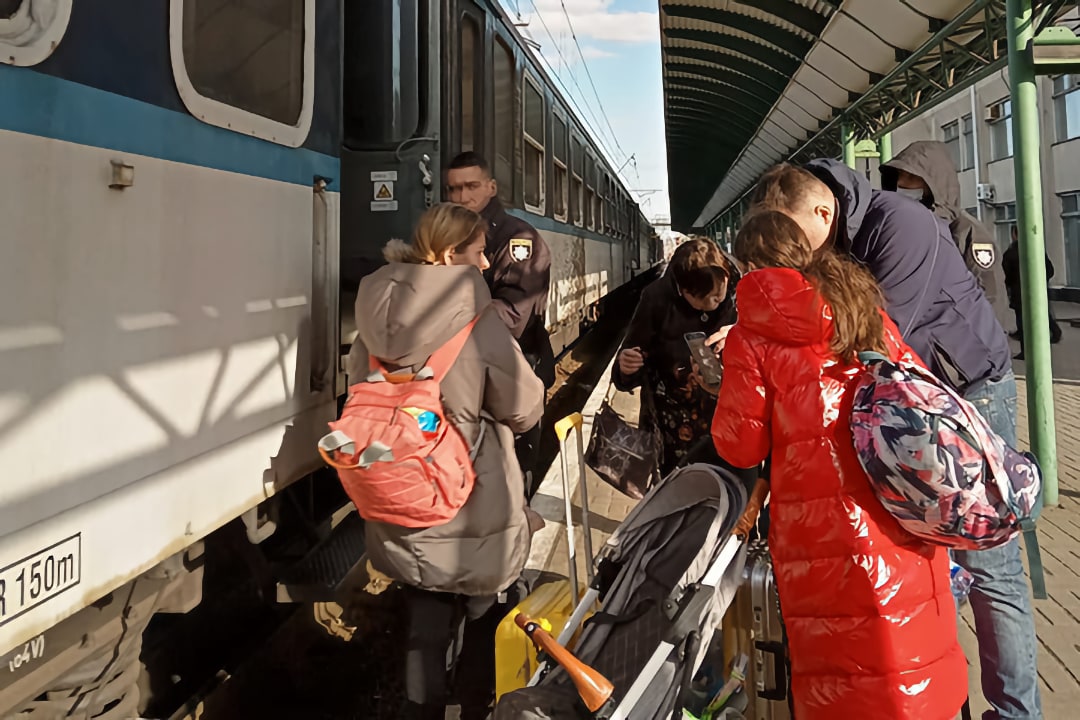
By Quentin Wodon, Chair of the Rotary Action Group for Refugees, Forced Displacement, and Migration
UNHCR estimates that there are more than 100 million forcibly displaced people globally. The number rose to 89 million by the end of 2021 according to the latest report on global displacement, released a few days ago. But since then, apart from crises elsewhere in the world, eight million people were displaced in Ukraine and six million became refugees in other countries.
Rotarians and Rotaractors have stepped up to respond to the crisis in Ukraine. Through April 2022, donations to the Disaster Response Fund were allocated for humanitarian aid to support Ukrainian refugees and communities impacted by the war, with more than $15 million raised. At the time of writing this post, The Rotary Foundation has supported 138 disaster response grants through $4.2 million allocated across 27 countries. Districts can continue to apply for these grants to support communities impacted by the war throughout 2022.
20 June is World Refugee Day. The annual observance honors the strength and resilience of refugees. Celebrations first started in Africa, with the United Nations later adopting a resolution for the Day in 2001, during the 50th anniversary of the 1951 Convention on Refugees. Issues related to refugees, forced displacement, and migration are here to stay, with climate change likely to bring additional stress. Here are five simple ways through which Rotary members, our clubs, and our districts can help:
- Raise awareness and advocate. In many areas of the world, support available to refugees, forcibly displaced persons, and migrants is inadequate. Rotarians and Rotaractors can help raise awareness of their plight and advocate for humane policies and humanitarian assistance, as well as longer-term investments through education and employment opportunities. Clubs can allocate one or more meetings to discuss ways for their members to engage. You can:
- Invite refugees and migrants as speakers, or agencies who work directly with newcomers;
- Organize events in collaboration with newcomers and resettlement agencies in your community;
- Explore partnership opportunities with immigration resettlement agencies.
As just one example, thanks to a member of my club who teaches at a university, the university made two full scholarships plus housing available to Afghan women. This type of advocacy makes a difference!
- Support refugees where you live. Many Rotarians and Rotaractors have provided shelter for refugees. Others are helping newcomers register for classes, find employment, or simply ensure they have basic necessities. Last month, Rotary International organized a webinar on Supporting Refugees in the US: Opportunities and Resources from Welcome.US and Rotary. Welcome.US is a nonprofit aiming to support the resettlement of Afghan and Ukrainian refugees in the United States. A recording of the webinar is available and Welcome.US has prepared resources for U.S. communities to better support refugees. Similar efforts to welcome refugees exist in other countries. As individuals or as clubs, you can join these efforts.
- Volunteer with nonprofits. Refugees need help settling in their new community, and you can volunteer to help. If you speak a particular language, you could serve as a translator, or you could perhaps teach your national language as a second language for newcomers. Refugee children often need help in school – you can volunteer as a tutor after school or help organize recreational activities. You can help obtain books in their language for refugee children as another Rotarian from my club is doing for Afghan children through his nonprofit. Or you could help adults acquire skills, write a resume, prepare for an interview, or work with your employer or staff to create jobs for newcomers. Opportunities to provide support are many and local nonprofits working with refugees can advise you or your club on how to engage.
- Implement international projects. Most refugees around the world have been refugees for many years, living in camps and settlements that do not attract media attention. The Rotary Foundation’s global and district grants are great vehicles for providing better opportunities for refugees within Rotary’s areas of focus. You can also implement projects outside of the Foundation’s grant mechanisms and may need to if the type of support you provide is not eligible for a grant. There have been many such wonderful projects, including one providing meals for Venezuelan refugees. More examples of how the Rotary community is supporting newcomers, locally and internationally, are available on Rotary Showcase.
- Donate to The Rotary Foundation and other reputable organizations. Donations are key to enable nonprofits to serve refugees, forcibly displaced people, and migrants. You can support Rotary’s member-led initiatives by giving to your club or district response efforts, or The Rotary Foundation. You can also donate to other reputable organizations with a long history and expertise working in refugee resettlement.